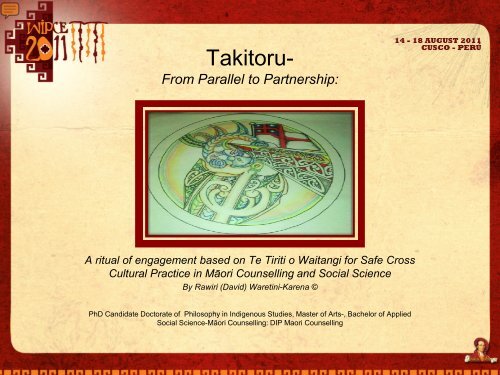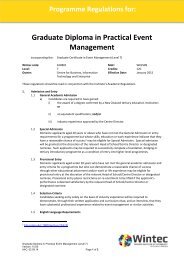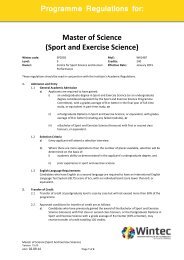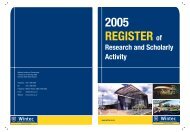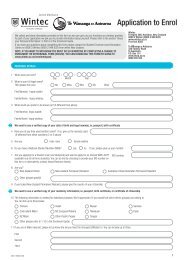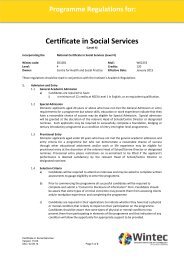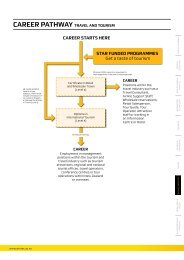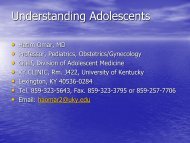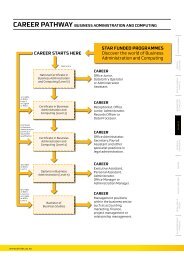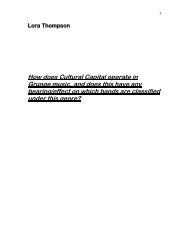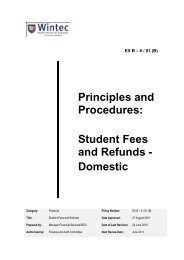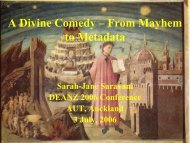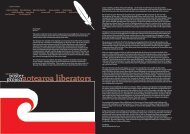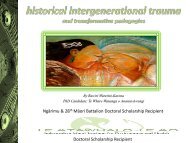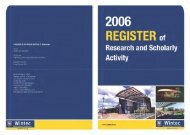Takitoru- From Parallel to Partnership: - Wintec Research Archive
Takitoru- From Parallel to Partnership: - Wintec Research Archive
Takitoru- From Parallel to Partnership: - Wintec Research Archive
You also want an ePaper? Increase the reach of your titles
YUMPU automatically turns print PDFs into web optimized ePapers that Google loves.
<strong>Taki<strong>to</strong>ru</strong>-<br />
<strong>From</strong> <strong>Parallel</strong> <strong>to</strong> <strong>Partnership</strong>:<br />
A ritual of engagement based on Te Tiriti o Waitangi for Safe Cross<br />
Cultural Practice in Māori Counselling and Social Science<br />
By Rawiri (David) Waretini-Karena ©<br />
PhD Candidate Doc<strong>to</strong>rate of Philosophy in Indigenous Studies, Master of Arts-, Bachelor of Applied<br />
Social Science-Māori Counselling: DIP Maori Counselling
Aim:<br />
Rationale:<br />
To support Maori counselling & Social Science students:<br />
• To engage with Tangata Whenua<br />
• To mediate between Tangata Whenua & other stake holders<br />
• To create culturally safe space between stakeholders of NZ<br />
Goal:<br />
• To utilise Te Tiriti o Waitangi for building interrelationships.<br />
• That students become multi lingual with theories and theorists<br />
• That students understand how colonisation shaped cultural safety.<br />
Objective:<br />
• To develop graduates who are/can:<br />
• Culturally safe practitioners with a firm knowledge of his<strong>to</strong>rical contexts<br />
• Articulate cultural action for social change using Decolonising and<br />
Kaupapa Maori as well as western language and terminologies.
Why is it important?<br />
• A significant percentage of Tangata Whenua (Māori)<br />
utilise social services.<br />
• Majority of social services are run by Tangata Tiriti<br />
(Pākeha).<br />
• There are misunderstandings as a result of different<br />
worldviews and polarities of thinking.
Intro What is <strong>Taki<strong>to</strong>ru</strong>?
<strong>Taki<strong>to</strong>ru</strong> tukutuku pattern:
Roimata <strong>Taki<strong>to</strong>ru</strong><br />
Auckland Museum (1997)
Whakawhanaungatanga in a Powhiri<br />
Making connections-Establishing Relationships<br />
“A Powhiri is an encounter calculated <strong>to</strong> reduce space<br />
and distance between groups and <strong>to</strong> explore the basis of<br />
a relationship” (Durie, M., 2003, pg. 53).
“Question”<br />
• What is safe cultural practice?
Safe Cultural practice definition<br />
“An environment, which is safe for people; where there is<br />
no assault, challenge or denial of their identity, of who<br />
they are, and what they need. It is about shared respect,<br />
shared meaning, shared knowledge and experience, of<br />
learning <strong>to</strong>gether with dignity, by truly listening”<br />
(Williams,R.1998,pg.2).
<strong>Parallel</strong> <strong>to</strong> <strong>Partnership</strong> Stake holder model:<br />
Tangata Whenua<br />
Stakeholder<br />
Worldview<br />
Shared<br />
Space<br />
Tangata Tiriti<br />
Stake holder<br />
Worldview<br />
Te Tiriti O Waitangi 1840 –foundation:
Question:<br />
• Who are the Stakeholders of this framework?
Tangata Whenua - Definition:<br />
A first nations indigenous native (Māori) whose blood<br />
DNA is connected <strong>to</strong> the whenua (land) - Papatuanuku<br />
(Mother Earth) through the <strong>to</strong><strong>to</strong> (blood) of Tupuna<br />
(ances<strong>to</strong>rs) that goes all the way back <strong>to</strong> the Maori<br />
mythological s<strong>to</strong>ries of creation. (Karena, D, 2011).
Tangata Tiriti - Definition:<br />
• All people (Pākeha) whose ances<strong>to</strong>rs settled in New<br />
Zealand via Te Tiriti o Waitangi treaty 1840<br />
• All peoples who accept that the Treaty of Waitangi<br />
relationship is important for creating dialogue in shared<br />
space (Karena, D, 2011).
Tangata Tauiwi-Definition:<br />
• All people who have migrated <strong>to</strong> New Zealand who are<br />
not yet aware of Te Tiriti o Waitangi treaty 1840<br />
(Karena, D 2011).
Setting basis for <strong>Taki<strong>to</strong>ru</strong><br />
framework:<br />
• Educa<strong>to</strong>rs must reject colonial curricula that offer<br />
students a fragmented and dis<strong>to</strong>rted picture of<br />
Indigenous peoples, and offer students a critical<br />
perspective of the his<strong>to</strong>rical context that created that<br />
fragmentation (Battiste, M, 2005, pg. 225).
Professional<br />
Practice<br />
Culturally<br />
Safe Practice<br />
Te Tiriti o<br />
Waitangi<br />
cultural<br />
action for<br />
social<br />
change?<br />
Critical<br />
Analysis<br />
Maori<br />
counselling<br />
& Social<br />
Science<br />
students<br />
Holistic<br />
analysis<br />
Conflict<br />
Theories<br />
Conscienti<br />
sation<br />
Theories<br />
Decolonising<br />
Theories<br />
Kaupapa<br />
Maori<br />
Theories<br />
Transform<br />
ative<br />
Theories
Examples of safe cultural practice<br />
Maori counselling<br />
& Social Science<br />
students learn<br />
Appropriate<br />
pro<strong>to</strong>cols <strong>to</strong><br />
engage with<br />
Maori in<br />
shared space<br />
Understand<br />
his<strong>to</strong>rical<br />
colonial<br />
contexts that<br />
created<br />
unequal<br />
power base<br />
To create a<br />
rapport in a<br />
culturally<br />
appropriate<br />
manner<br />
To establish a<br />
relationship<br />
using<br />
appropriate<br />
language<br />
To be<br />
sensitive and<br />
respectful <strong>to</strong><br />
not make<br />
judgements<br />
Interpret or<br />
direct
Fostering safe cultural practice:<br />
By training professionals <strong>to</strong> learn about racism they would<br />
then be equipped <strong>to</strong> practice in a culturally appropriate<br />
way. The cultural safety example is one model that works<br />
<strong>to</strong>ward unlearning racist practices... (Moeke-Pickering, T,<br />
2010, pg. 39).
Preconceived Values & Perceptions
Tangata Whenua values<br />
• Language tikanga (principles) and culture make up identity<br />
• Have an intrinsic relationship with the whenua (land), Ngāhere (forests)<br />
and Moana (sea) who are also considered Tupuna (ances<strong>to</strong>rs).<br />
• Kaitiaki guardians over Ranginui (Father Sky) and Papatuanuku (Mother<br />
Earth).<br />
• Holistic way of viewing the world that values inter-relationships<br />
• Cultural identity is fundamental <strong>to</strong> our way of being and wellness.
Perceptions of Tangata Tiriti:<br />
• a mono-cultural dominant discourse.<br />
• Use societal powerbase for maintaining power & control over the<br />
indigenous peoples and their land.<br />
• View all resources from capitalist lenses that subjugate Father<br />
Sky and Mother Earth <strong>to</strong> positions of being a commodity<br />
• Put structures and policies ahead of the needs of its people.
Tangata Whenua his<strong>to</strong>rical perceptions<br />
when meeting in shared space<br />
Acknowledge Maori Worldview<br />
Dominant Discourse<br />
Equal share of resources<br />
Kaitiakitanga<br />
Tangata Whenua<br />
Institutional, Societal<br />
powerbase<br />
Western privilege<br />
Tangata Tiriti<br />
Cus<strong>to</strong>mary Practices<br />
Honoring Te Tiriti O Waitangi<br />
Shared Space - Oppressed<br />
Industrial base<br />
Assimilation practices<br />
Places structures<br />
ahead of relationships<br />
His<strong>to</strong>ric & current<br />
breaches of Te Tiriti
Transforming Subjugation and Oppression<br />
• Oppressors who oppress, exploit, and rape by virtue of<br />
their power, cannot find in this power the strength <strong>to</strong><br />
liberate either the oppressed or themselves. Only<br />
power that springs from the weakness of the<br />
oppressed will be sufficiently strong <strong>to</strong> free both.”<br />
(Freire, P, 1996, Pg. 26).
Preamble:<br />
Intro Te Tiriti o Waitangi Preamble1840<br />
• Secure Tino Rangatiratanga-Self<br />
determination<br />
• Secure Maori land ownership.<br />
(Waitangi Tribunal 2011)
Te Tiriti o Waitangi 1840<br />
Signed between Governor Hobson of the British Empire & 500 Māori<br />
Chiefs.<br />
Article 1: Māori give <strong>to</strong> the Queen of England the right <strong>to</strong> have a Governor in<br />
New Zealand.<br />
Article 2: The Queen agrees that Māori keep their independence and control<br />
over their lands and everything that is important <strong>to</strong> them.<br />
Article 3: The Queen give Māori people the same rights as British people.<br />
Article 4: The Governor promises <strong>to</strong> protect Māori cus<strong>to</strong>ms and the different<br />
religions in New Zealand.<br />
(Tangata Tiriti, 2006)
Te Tiriti o Waitangi – Agreement:<br />
Agreed <strong>to</strong> share<br />
Agreed <strong>to</strong> keep:<br />
Governor<br />
Sovereignty<br />
Rights of British people<br />
Trade & technology<br />
Tangata<br />
Whenua<br />
Worldview<br />
Shared<br />
Space<br />
Tangata Tiriti<br />
Worldview<br />
Cus<strong>to</strong>mary Native title<br />
Lands designated for<br />
Maori<br />
Land & resources<br />
Te Tiriti O Waitangi 1840 –foundation:<br />
Cus<strong>to</strong>ms, beliefs, culture
Treaty of Waitangi violations Legislative - Critical Analysis<br />
Benefits of breaching TOW for Tangata Tiriti – Land & resources<br />
Consequences of Breaching TOW for Tangata Whenua - Land &<br />
resources<br />
‣1844 NZSG has <strong>to</strong> pay British Empire rent (taxes) for right <strong>to</strong> occupy NZ .<br />
‣NZSG breaches Pre emption in article 2 <strong>to</strong> sell land on the open market <strong>to</strong> pay taxes<br />
<strong>to</strong> the British Empire.<br />
‣1846 Governor Grey abolishes protec<strong>to</strong>rate Dept & gives NZSG exclusive right of<br />
pre emption.<br />
‣Native lands Act 1862 designed <strong>to</strong> break down communal ownership.<br />
‣Native reserves Act 1864: All remaining reserve land put under settler control of<br />
the Crown.<br />
Changed the terms & conditions set out in TTOW & International law based on the Doctrine of<br />
Discovery<br />
This is illegal as the NZSG did not sign the TOW so therefore had no legitimate authority.<br />
Ultimately it made Maori landless<br />
Benefits of breaching TOW for Tangata Tiriti - Blocking all forms<br />
of redress & accountability<br />
Consequences of Breaching TOW for Tangata Whenua – Blocking all<br />
forms of redress & accountability<br />
Suppression of Rebellion Act 1863<br />
• No right <strong>to</strong> trial before imprisonment. Its intention was <strong>to</strong> punish certain tribes for<br />
perceptions of rebelling against the Crown.<br />
• 1877 The Treaty is declared a nullity by Judge Prendergast in the Bishop of<br />
Welling<strong>to</strong>n v Wi Parata case. Legislation was introduced <strong>to</strong> allow direct purchase<br />
of Maori land. This was another breach of Article 2,<br />
Maori Prisoners Act 1880<br />
• 200 Māori were arrested in Taranaki for preventing surveying of confiscated land.<br />
Validation of invalid Land Sales Act: 1894<br />
• Any Pakeha misdealing's concerning Maori lands were legitimised.<br />
Benefits of breaching TOW for Tangata Tiriti – Assimilation &<br />
subjugation of Culture / language & identity.<br />
• All avenues for redress or compensation were blocked, changed or ignored<br />
• By declaring the Treaty of Waitangi a nullity there became no accountability <strong>to</strong> anyone<br />
• By arresting any Maori who protested NZSG were asserting their authority over the Tangata<br />
Whenua.<br />
• By validating fraudulent land deals Maori had no one <strong>to</strong> turn <strong>to</strong> for redress of illegal dealings<br />
putting Maori between a rock and a hard place.<br />
Consequences of Breaching TOW for Tangata Whenua – Assimilation &<br />
subjugation of Culture / language & identity.<br />
The Native Schools Act: 1867<br />
• Was passed extending the parameters of the 1858 Act. These schools would<br />
assist in the process of assimilation. 1871<br />
• A Government stipulation that instruction in Native Schools had <strong>to</strong> be in English.<br />
• 1905 The abolition of Native Councils (they had slowed down the Government's<br />
land purchases).<br />
• Tohunga Suppression Act: 1908<br />
• Penalties were imposed on <strong>to</strong>hunga (experts in Maori medicine and Maori<br />
spirituality).<br />
•<br />
• Under the Native Schools act our ances<strong>to</strong>rs were beaten for speaking their own language<br />
making the indigenous people undervalue their own culture.<br />
• The NZSG blocked all forms of power and authority assured under Te Tiriti o Waitangi<br />
• Took away all forms of indigenous knowledge<br />
• Maori became strangers in their own land taking on western ideologies and ways of being.
Students <strong>to</strong> contextualize impacts<br />
of Te Tiriti o Waitangi violations<br />
His<strong>to</strong>rical<br />
context<br />
Societal<br />
context<br />
Institutional<br />
context<br />
Personal<br />
context.
Front middle three: NZ Prime Minister Richard Sedden, Māori King Mahuta, Te Nahu Te Kuri Waretini Wetini
Contextual his<strong>to</strong>rical intergenerational trauma in genealogy<br />
Generation 4<br />
1840 - 1940<br />
Relationship with<br />
the Colonials<br />
Great Grandfather:<br />
Te Nahu Te Kuri Waretini- Weteni.<br />
Warrior; Spiritual advisor <strong>to</strong> the Kahui<br />
arikinui<br />
Te Tiriti o Waitangi 1840<br />
‣Legislation violations<br />
‣New Zealand Wars<br />
‣Land confiscations<br />
‣Disenfranchised from whenua, &<br />
collective holistic societal infrastructure<br />
‣Assimilated <strong>to</strong> follow western<br />
worldview<br />
‣Tangata Whenua as a nation became<br />
depressed & oppressed<br />
Was a Kingitanga Toa -Warrior<br />
‣Fought for Kingitanga in the<br />
Waika<strong>to</strong> invasion 1863<br />
‣Went with King Tawhiao exiled<br />
in<strong>to</strong> the King country.<br />
‣Fought with Rewi Maniapo<strong>to</strong> at<br />
Orakau Pa<br />
‣Spiritual advisor <strong>to</strong>: King<br />
Mahuta, King Te Rata, Princess<br />
Te Puea<br />
‣Died 1940<br />
Generation 3<br />
1920-1989<br />
Aftermath of<br />
colonial assimilation<br />
Grand Father:<br />
Kapa (Tom) Te Wharua Waretini Weteni<br />
Te Pou o Mangatawhiri band member:<br />
Impacts of New Zealand Wars<br />
‣Legislation violations<br />
‣World War 1<br />
‣Global influenza epidemic<br />
‣Depopulation of Maori race<br />
‣Landless<br />
Brought up by Princess Te Puea<br />
‣Helped build Turangawaewae<br />
Marae<br />
‣Spoke Maori but was caned and<br />
punished in school.<br />
‣Fought in World War Two<br />
‣Moved away from Māori culture<br />
for western religion<br />
‣None of his children learnt Māori<br />
culture or language.<br />
Generation 2<br />
1946 – 1996<br />
Once were Warriors<br />
generation<br />
Father:<br />
Raymond Bartholomew Waretini Karena<br />
Maori show bands -<br />
Welder-Boilermaker<br />
(Dusty) - Rubbish truck runner<br />
Pepper potting rural <strong>to</strong> urban<br />
migration assimilation generation<br />
‣Legislation violations<br />
‣ Couldn’t speak Maori & had very<br />
limited knowledge about the culture.<br />
‣Landless, living in lower socio<br />
economic environment away from<br />
confiscated whenua<br />
‣Violent abusive upbringing Physically<br />
abused by step father and uncles<br />
Never knew his biological father<br />
until he was 25 years old<br />
‣Under valued anything Maori<br />
‣Put partying and his friends<br />
before his family<br />
‣Beat and abused his wife and<br />
children<br />
‣Was not taught any principles so<br />
did not instill values or ethics in<strong>to</strong><br />
his children<br />
Generation 1<br />
Rediscovering my<br />
cultural heritage<br />
Mokopuna:<br />
Rawiri-David-Waretini-Junior :Karena<br />
Musician - Lecturer:<br />
PhD Candidate, Master of Arts, B, App<br />
Scoc, Sci, DIP<br />
Grew up lower socio economic<br />
urban environment.<br />
‣ Made Ward of the State at 5yrs old &<br />
removed from whanau<br />
‣Spent 22 years away from whanau<br />
being fostered <strong>to</strong> the state<br />
Grew up with no identity<br />
‣Did not know my native<br />
language or culture.<br />
‣Brought up by the state.<br />
‣Decided <strong>to</strong> change the cycle<br />
‣Chased an education<br />
‣Went <strong>to</strong> rediscover my cultural<br />
heritage
• The psychology of oppression is a process of mental,<br />
physical and spiritual conditioning or re conditioning<br />
that strikes at the very seed and growth process of the<br />
inner self… Eventually an aura of self loathing and<br />
learned helplessness becomes the norm of negative<br />
developmental thought and self perception…<br />
(Campbell, D, 2006).
Key<br />
Death<br />
Contextualizing symp<strong>to</strong>ms of his<strong>to</strong>rical Intergenerational<br />
trauma through Genogram<br />
Great Grand Father<br />
Great Grand Mother<br />
Violence<br />
Alcohol<br />
Grand Father<br />
Grand Mother<br />
Jail<br />
Father<br />
Mother<br />
Gangs<br />
Elder brother<br />
Lost land<br />
War<br />
Elder sister<br />
Younger brother<br />
Gamble<br />
Degrees
His<strong>to</strong>rical Intergenerational trauma<br />
• The native idea of his<strong>to</strong>rical trauma involves the<br />
understanding that the trauma occurred in the spirit or<br />
soul… ( Duran, E, 2006, p.7).
Re-establishing relationships<br />
between stake holders<br />
By acknowledging that the relationship needs <strong>to</strong> be re- established<br />
from a position founded on Te Tiriti o Waitangi brings all stake<br />
holders <strong>to</strong>gether again.
Current Relationship<br />
Tangata<br />
Tauiwi<br />
Shared Space<br />
Tangata<br />
Whenua<br />
Tangata Tiriti
<strong>Partnership</strong> Relationship<br />
Tangata<br />
Tauiwi<br />
Tangata<br />
Whenua<br />
Shared Space<br />
Tangata<br />
Tiriti
Kawa: Guidelines<br />
• The kawa or guidelines determine the context of the relationship,<br />
as well as the grounds under which the relationship is<br />
established.
Kawa-guidelines in shared Space<br />
Removing<br />
Stereotypes<br />
Allow<br />
Au<strong>to</strong>nomy<br />
Manakitanga<br />
Respect<br />
Te Tiriti O Waitangi<br />
Shared Space<br />
Humarie<br />
Genuine<br />
Shared<br />
Meaning &<br />
Understanding<br />
Ngawari<br />
Approachable<br />
Shared<br />
Contribution
Developing effective Maori counselling<br />
and social science students<br />
Cross culturally<br />
clinical in<br />
competence<br />
Cross culturally<br />
professional in<br />
Practice<br />
Cross<br />
culturally<br />
flexible in<br />
approachability<br />
& sensitivity<br />
Shared Space
Atua<br />
Tupuna<br />
DOI 1835<br />
TTOW 1840<br />
Ture 1993<br />
Tangata<br />
Whenua<br />
Shared<br />
Space<br />
NZ Settler<br />
Government<br />
TOW 1840<br />
Cus<strong>to</strong>mary Maori Law/Lore<br />
Kaitiaki<br />
Tiriti<br />
Tangata Tiriti<br />
Ahi ka<br />
Manuwhiri<br />
Tangata Tauiwi<br />
Maku ano <strong>to</strong>ku nei whare, Ko te tāhuhu he Hinau, Ko nga poupou he Māhoe, he Pātete
Conclusion<br />
This presentation endeavours <strong>to</strong> educate and train Maori Counselling and Social<br />
Science students about:<br />
• The important role Te Tiriti o Waitangi plays in forming meaningful relationships.<br />
• Understand the implications and impacts of his<strong>to</strong>rical contexts<br />
• Why the need <strong>to</strong> create dialogue based on the pro<strong>to</strong>cols and worldview of the<br />
indigenous culture they engage with.<br />
• Why the need <strong>to</strong> development alternate theories and transformative constructs that<br />
advocate a more inclusive society.
References:<br />
• Battiste, M. (2005). Post-colonial remedies for preserving Indigenous<br />
knowledge and heritage. In P. Tripp, & L. Muzzin (Eds.), Teaching as<br />
activism: Equity meets environmentalism (pp. 224-232). Montreal, QC:<br />
McGill-Queen’s University Press.<br />
• Cambell, D,.(2006).The Psychology of Oppression. Retrieved July<br />
2011 from: http://www.rodneyohebsion.com/inner-strength-defies-theskeptic/the-psychology-of-oppression.htm<br />
• Churchill,W.(1993). Struggle for the land: Indigenous resistance <strong>to</strong><br />
genocide, ecocide and expropriation in contemporary North America.<br />
Maine: USA. Common Courage Press. Pgs 33-63<br />
• Duran, E. (2006). Healing the soul wound: Counseling with American<br />
Indians and other Native Peoples. New York, NY: Teachers College<br />
Press.<br />
• Durie, M. (2003).NGA KAHUI POU; Launching Maori futures. Welling<strong>to</strong>n;<br />
New Zealand. Huia Publishers.
• Freire, P. (1970). Pedagogy of the oppressed. London: Penguin Books.<br />
• Freire, P. (1996). Pedagogy of the oppressed.(2nd ed). London: Penguin<br />
Books.<br />
• Moeke-Pickering, T.M. (2010). Decolonisation as a social change<br />
framework and its impact on the development of Indigenous-based<br />
curricula for Helping Professionals in mainstream Tertiary<br />
Education Organisations. A thesis submitted in partial fulfilment of the<br />
requirements for the degree of Doc<strong>to</strong>r of Philosophy. Retrieved<br />
September 2 2010 from: http://Māori counsellingforum.blogspot.com/
• TWM.(N.D). Legislative Violations of the Treaty of Waitangi. Retrieved<br />
July 2011 from: http://twm.co.nz/Tr_violn.html<br />
• Treaty Educations for migrants group.(2006). Tangata Tiriti- Treaty<br />
People: An interactive workbook on the Treaty of Waitangi. Auckland:<br />
New Zealand. Auckland Workers Educational Association.<br />
• Williams, R.(1998). Cultural Safety; What does that mean for our work<br />
practice. Retrieved March 12 from;<br />
http://www.ruralhealth.utas.edu.au/indigenoushealth/RevisedCulturalSafetyPaper-pha.pdf<br />
• Waitangi Tribunal.(2011). Treaty of Waitangi Preamble. Retrieved July<br />
2011 from: http://www.waitangi-tribunal.govt.nz/treaty/meaning.asp


